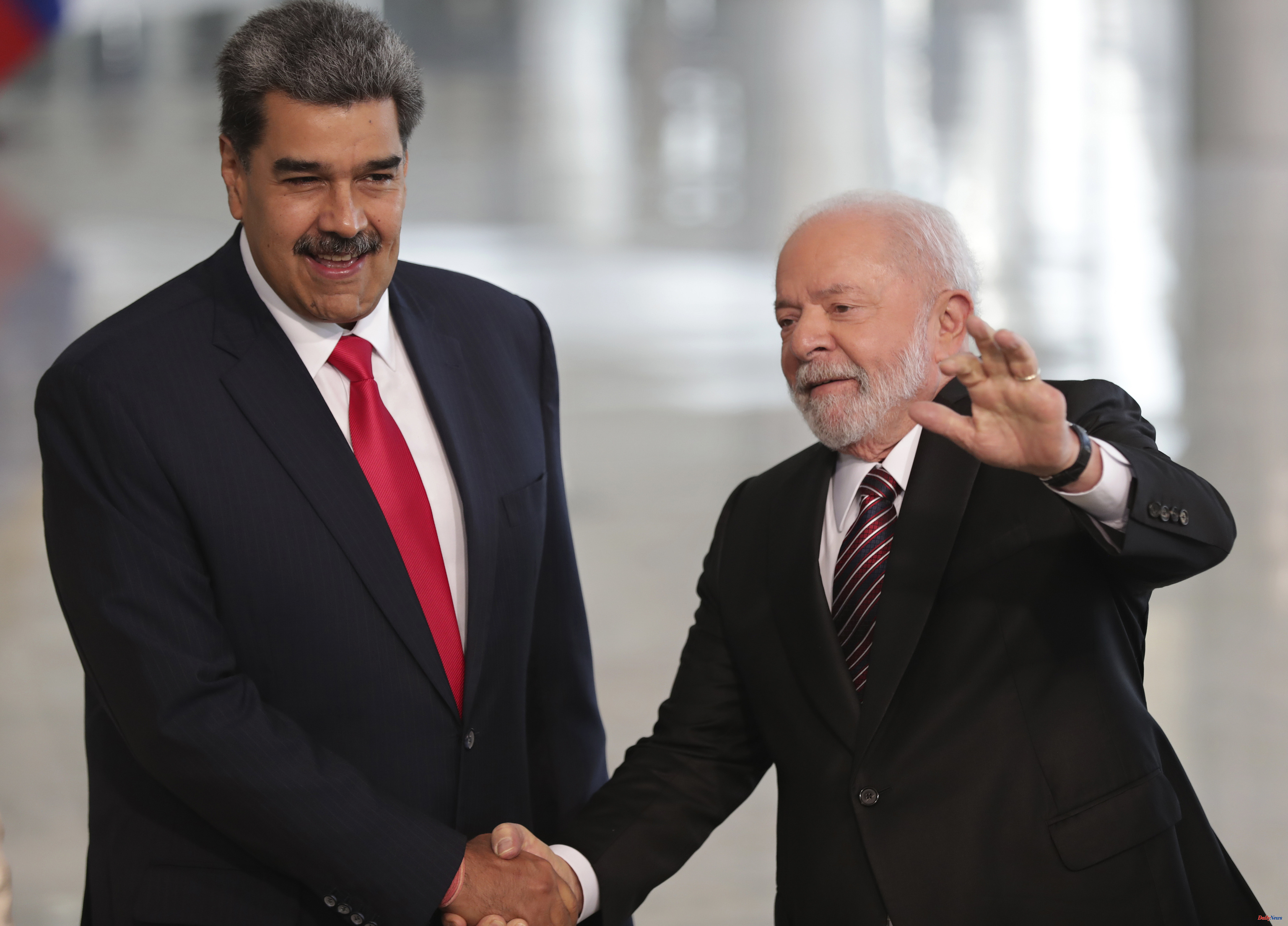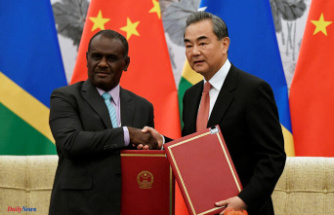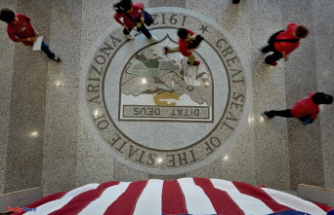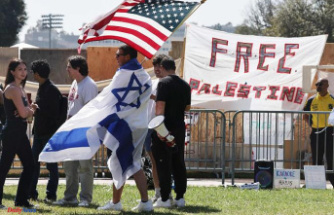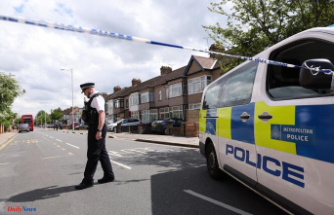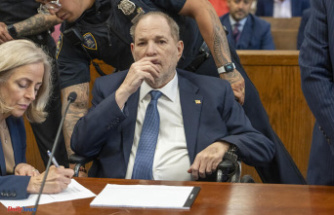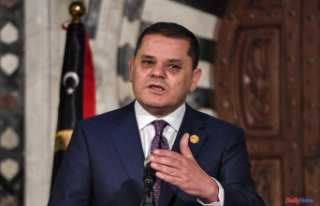Freed from any diplomatic ties or hint of prudence, the president of Brazil, Luiz Inácio Lula da Silva, closed the turbulent South American Summit with a renewed and fiery defense of the Venezuela of Nicolás Maduro. So much so, that the leader of the largest economy in Latin America said he felt reflected in the head of the Venezuelan regime: he believes that both have been victims of a narrative that sought to destroy their political careers.
"At the time they did it with me," Lula said Tuesday night, drawing a parallel with his imprisonment for corruption between 2018 and 2019. After almost two years in jail, the three-time Brazilian president was released for technical reasons procedural.
"A narrative was built against (Hugo) Chávez, I could see that, it is decided that the guy is a demon, and from that everyone plays against him. It happened with Chavez, it happened with me, the number of hours on television, radio , 60 magazine covers to create a narrative against me that no one could prove later...".
"That is why I told Maduro that there is a narrative in the world that there is no democracy in Venezuela and that his obligation is to create a narrative with true facts. And I am going to say something that I should not say, because it was a conversation between presidents. I told him: 'you have to sign a document with the signature of all the opposition parties, Parliament, all the social movements, governors, in which respect for the sovereignty of Venezuela is requested.' a person who did not exist. And Venezuela suffers a blockade that is inhumane. Venezuela deserves respect."
Turned on, Lula reinforced the supposed parallelism between Venezuela and Brazil, between Maduro and himself: "Right here we have had a troglodyte who does not believe in the results of the elections and wanted to carry out a coup on January 8." "You are journalists and you know what I'm talking about: whoever builds the first narrative wins the game," he added.
"I have always defended the idea that each country is sovereign to decide its political regime and its internal affairs," added the 77-year-old veteran head of state, who assumed power on January 1 of this year.
On Monday, Lula had unleashed a great controversy by pointing out that the human rights violations of the authoritarian regime of Venezuela, which sent more than seven million people into exile, are part of a "narrative" that the Maduro government should take care of. to counter by creating your own.
These statements were confronted by several presidents. During the summit that brought together the 12 South American countries for the first time in almost ten years, the Uruguayan Luis Lacalle Pou said he was "surprised" by the fact that Lula defined what is happening in Venezuela as "narrative", and left a sharp phrase : "We are going to be judged for our actions, we have to go there. Let's not waste time, life is over and although some believe it is not, governments are too".
The Chilean Gabriel Boric is, at 37, the youngest president of South America. When he was born, in 1986, Lula was leading the second of his six presidential campaigns. "Judging by the experience of each one, it is the Brazilian who has to teach the Chilean lessons, but that was not what happened," said "O Globo". "It is not a narrative construction, it is a reality," said Boric forcefully, whom part of the Workers' Party (PT) government considers a left-wing president surrendering to the right.
"I have had the opportunity to see (that reality) in the eyes and in the pain of hundreds of thousands of Venezuelans who are in our homeland today and who also demand a firm and clear position," added Boric, who won the antipathy of the sectors furthest to the left of the Brazilian government.
Beyond what is going on in the microclimate of the Planalto Palace, the general reaction in Brazil to Lula's comments on Venezuela was disbelief.
"Comrade Maduro. You know the narrative that was built against Venezuela: anti-democracy, authoritarianism. So, I believe that Venezuela must show its narrative so that people change their minds. There are people who don't even know where Venezuela is, but you know that Venezuela has democracy problems. So you need to build your narrative. And I think, from everything we've talked to you about, that your narrative is going to be infinitely better than the narrative against you. It's effectively inexplicable That a country suffers 900 sanctions because there is another country that does not like that country. Inexplicable!"
That succession of sentences on Monday changed the axis of the Summit, to which Lula arrived with a maximum hypothesis - the resurrection of Unasur, the Union of South American Nations - and a lot of ambition.
"The European Union (EU) created the euro, why can't the BRICS create their currency?" asked the Brazilian, who spoke of the "enormous geopolitical change" he envisions when raising his criticisms of the functioning of the Security Council of the United Nations and its goal that that body be reformed and expanded.
However, Venezuela was the gravitational axis throughout the Summit, in which Guillermo Lasso, president of Ecuador, and Mario Abdo Benítez, president of Paraguay, also questioned Lula's theories on Venezuela. Alberto Fernández, the president of Argentina, instead sided with Lula and held a bilateral meeting with Maduro, the first in three and a half years of government.
During a lengthy and at times electric press conference on Tuesday night, Lula went into great detail about his theories about what is happening in Venezuela and what the international community should do. "The demands for democracy that are made to Venezuela are not made to Saudi Arabia, it is very strange!" said the Brazilian head of state before criticizing the EU.
"I have told the European Union. How is it possible that you, who are a democratic patrimony of humanity, support an impostor in the Presidency like Juan Guaidó."
"The one who is going to help Venezuela is Venezuela itself. They talk about democracy in Venezuela... It is not possible to say that there is no democracy in Venezuela. I joked with (Hugo) Chávez telling him that for anything he would hold a referendum. And I told him, uh, work a little."
Lula also highlighted that he recently sent Celso Amorim, his former foreign minister and current adviser for international affairs, to Venezuela, and that the veteran diplomat told him that he never saw a Venezuela as calm as it is today.
Regarding the future of Unasur, which will not revive as an organization, Lula managed to commit his peers to submit a document with the steps to follow for South American integration in 120 days. This 'road map' should be approved at a forthcoming Summit, which will not be held in Brazil.
According to the criteria of The Trust Project

